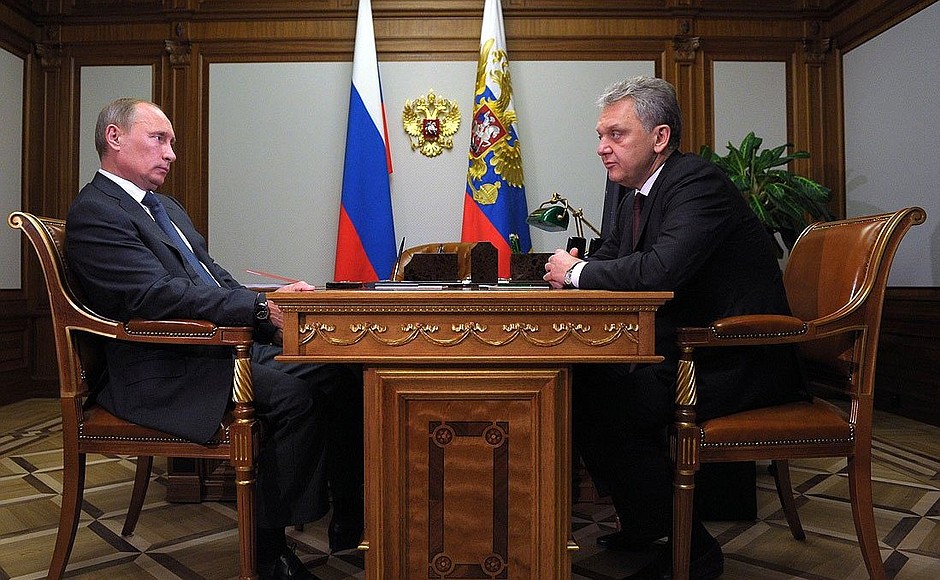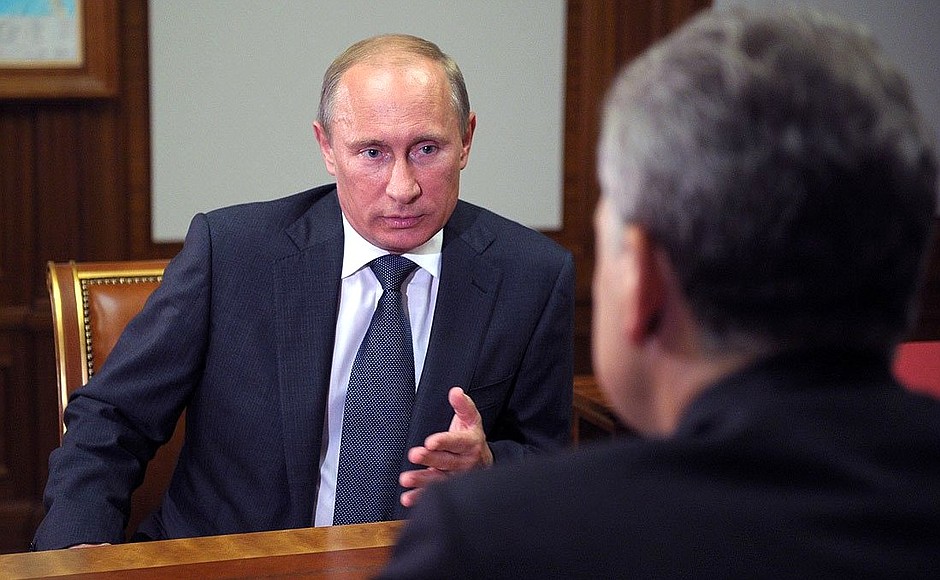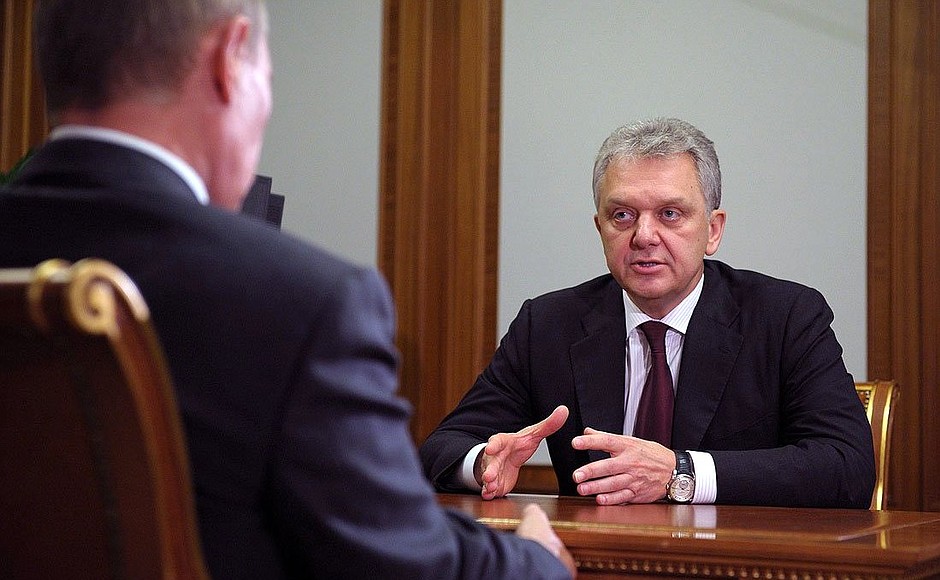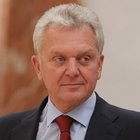The Commission’s work on pursuing integration within the Customs Union and issues related to Russia’s recent ratification of the WTO accession protocol were the subjects of discussion.
* * *
President of Russia Vladimir Putin: Good afternoon, Mr Khristenko. The procedures for Russia’s accession to the World Trade Organisation are almost complete now. You played an active part in this work in your time. The question now is that, acting within the framework of our agreements on the Customs Union and the Common Economic Space, we need to take a number of steps and coordinate them with our partners in these integration bodies. And so, my question is, what do you think we and the Customs Union Commission should do now?
chairman of the Board of the Eurasian Economic Commission Viktor Khristenko: Mr President, Russia has ratified and published the ratification protocol on accession to the WTO. A large part of the work that we need to do to meet our obligations is now at the supranational level, and so the [Customs Union] Commission has become very actively involved.
We spent several months working out a new common customs tariff with our Russian, Kazakhstani, and Belarusian partners, and the Commission has approved it. This is a big document of more than 1,100 pages covering more than 11,000 goods items, and it takes into account all of the obligations regarding access for goods from outside countries to our market – now access to the common market that the three partner countries form.
This document has been approved and officially published, and it will enter into force within 30 days. The 30-day period gives us the chance to synchronise the dates of entry into force of other obligations that Russia has taken on, and gives our trading partners the chance to prepare for these steps too.
See also
The Commission is principally involved in this at the moment, but its work on issues related to trade and the WTO goes beyond this.
As you know, all of the regulations that we are adopting within the Common Economic Space and the Customs Union are based on WTO norms. In this context, we are certainly developing and mastering what for us is a new arsenal of instruments – the instruments we need to protect our domestic market and the markets of the three partner countries. We are putting in place the administrative infrastructure we need for this purpose, we are in the process of refining it right now, and have almost completed this work. We are already investigating cases regarding market actors who in one way or another are suspected of using unfair competition on the market. With regard to a number of cases, in particular on cold-rolled steel, we recently decided to introduce anti-dumping duties. We are now examining cases on a number of very sensitive goods – combine harvesters, cars, and some other goods.
We are developing our use of this instrument for protecting our domestic market in accordance with the WTO rules. If they have exhausted other possibilities, plaintiffs in the three partner countries can now turn to the Commission and ask it to use the same kind of instruments as the WTO uses in order to defend their interests.
The technical regulation base is being actively updated and modernised. We have already adopted 31 Customs Union technical regulations, of which 7 have already taken effect and are being used in practice. The rest will come into force as scheduled.
Vladimir Putin: How have other CIS countries reacted to the regulations, and have any of them expressed interest in joining this process?
Viktor Khristenko: We drafted a special agreement making it possible for CIS countries not part of the Customs Union to implement the Customs Union technical regulations. Russia and Belarus have already completed the formalities and signed this agreement, and Kazakhstan is in the process of completing these procedures. As soon as these trilateral agreements are fully completed and signed, any CIS country that joins the agreement will be able to use the full base of technical regulations and standards, and the certification base too, setting up the institutions that will certify that goods meet the Customs Union technical regulations’ requirements, so as to give these goods facilitated access to our common market. This process works in reverse too, that is, Customs Union countries’ goods will also have facilitated access to these countries’ markets.
Ukraine has shown active interest in this agreement. During the talks with the Ukrainian Prime Minister and Economic Development Minister, they underscored the importance of working closely together in the area of technical regulations. This has huge importance for us too, because we are putting in place not just technical regulations but are developing a base of interstate standards. This is an even more extensive technical platform that comes to tens of thousands of documents that must be actively updated. Of course, our Ukrainian partners and we have an interest in pursuing this work together in order to raise our industry’s technological level.
Vladimir Putin: If they do not adopt these regulations they will have difficulties working on the markets in Russia, Kazakhstan, and Belarus.
Viktor Khristenko: Whatever the case, a tough filter will emerge…
Vladimir Putin: Quite simply additional administrative barriers.
Viktor Khristenko: Of course they will need to prove and confirm that they meet the standards whatever the case, confirm that they meet not only their national standards, but also the requirements of the Customs Union technical regulations, otherwise there will be no entry to the market, and for many of these countries the Russian, Belarusian, Ukrainian, and Kazakhstani markets are crucial for developing their industry. They therefore have direct interest in implementing the Customs Union regulations in their own countries.
Vladimir Putin: What is your overall assessment of the Commission’s work?
Viktor Khristenko: We have gone through the initial period and can say to some extent that we are now operating in regular mode and are only gathering pace now and building up the volume of work. Aside from the areas I just mentioned, the main processes are underway now in all the different areas: customs tariffs, protective measures, technical regulations, sanitary measures.
There is a related task, namely, to update and modernise the Customs Code. We have a common Customs Code for the three countries. It is in effect too in the Common Economic Space. Updating the Code would considerably facilitate the activities of honest foreign economic actors. Gradually, over the next two years, we hope to get the work on the Customs Code to the stage where foreign economic activity will not pose any problems for the actors involved. Of course, this is under condition that the national customs bodies responsible for enforcing the rules apply all the rules and regulations in proper fashion.
We are moving ahead too, on codifying the documents that make up the three countries’ international cooperation package, so as to meet the objective set by the three countries’ presidents, namely, to have the legal base for the Eurasian Economic Union in place by January 1, 2015. This codification is taking place rapidly, and we have already held more than 30 special meetings on the various specific areas. We will most likely have a draft of the codified agreement ready by mid-October. It will contain not only a clear and coordinated collection of prior decisions, but will be considerably supplemented with annexes and direct-effect documents. This is a big document and we hope to present it to the national governments by mid-October for their examination, so as to then complete this process even faster.
Furthermore, regarding 17 agreements that form the foundations of the Common Economic Space, we are carrying out our plans to expand and develop them. They are to a large extent framework agreements that require us to draw up a large number of documents – around 60 international agreements, which form the real agreement base in areas such as competition, macroeconomics, anti-monopoly policy, and tariffs policy. They will serve as the basis not only for the supranational body’s powers, but will essentially shape the face of the Eurasian Economic Union and give the Common Economic Space concrete substance. This work is going ahead actively.
In principle, going by the objective statistics, the results look quite decent. The three countries’ foreign trade with outside countries has increased by slightly more than 10 percent over the last five months (we have such statistics now), but reciprocal trade between the three countries posted an even higher increase – up by more than 15 percent, almost 16 percent. The trade structure between the three countries has also improved a lot more than the structure of trade with third countries. We all know that mineral resources, oil and gas dominate in our foreign trade, while in reciprocal trade between the three partner countries these goods, though they account for a large share (40 percent), are not dominating. Around 20 percent of our trade is machinery and equipment, and food products also account for a substantial share. This trade structure is a lot closer to that of any developed country. In this respect, the growth rate in reciprocal trade and change in the trade structure provide interesting and important indicators that enable us to judge quality.
Of course, the three countries vary in the way they are making use of the current situation. Our Belarusian colleagues are probably the leaders today when it comes to making use of the advantages the Customs Union offers, not only through their entrepreneurial activeness, but also through the situation on the currency market. I think that harmonisation, including of our currency policies, is something that business will soon start talking about, because it has a significant impact on flows, positioning, and competitiveness of goods even within the common market.
<…>



